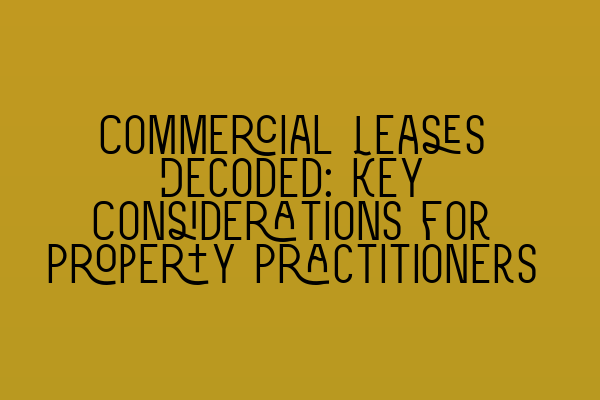Commercial Leases Decoded: Key Considerations for Property Practitioners
Welcome to SQE Property Law & Land Law! As experts in property law, we understand the complexity and importance of commercial leases in the real estate industry. Whether you’re a property practitioner or a business owner, it is crucial to have a clear understanding of the key considerations when dealing with commercial leases.
In this blog post, we will decode the intricacies of commercial leases and provide you with valuable insights that will help you navigate the complexities of this area of law. From lease negotiations to understanding tenant rights, we’ve got you covered.
1. Lease Negotiations: The foundation of a successful commercial lease starts with effective negotiations between the landlord and the tenant. As a property practitioner, it is your role to ensure that the terms and conditions of the lease are mutually beneficial for both parties. Key considerations during negotiations include the lease term, rent amount, renewal options, and any additional clauses such as rent reviews or break clauses. By being proactive and thorough in your negotiations, you can help your client secure a favorable lease agreement.
2. Lease Terms and Conditions: Once negotiations are complete, it is essential to carefully review and draft the lease agreement. This document establishes the rights and obligations of the landlord and the tenant. Key elements to consider include the permitted use of the premises, repair and maintenance obligations, alterations, and assignment and subletting provisions. It is crucial to ensure that the lease terms and conditions are clear, unambiguous, and aligned with the commercial objectives of your client.
3. Tenant Rights and Obligations: As a property practitioner, it is crucial to protect the rights and interests of your client, whether they are the landlord or the tenant. Understanding the tenant’s rights, such as the right to quiet enjoyment and protection from unfair eviction, is vital. Similarly, tenant obligations, such as paying rent on time and maintaining the property, must be clearly communicated and enforced. By providing comprehensive advice on tenant rights and obligations, you can help your client avoid potential disputes and legal ramifications.
4. Rent Reviews: Rent reviews are a common feature of commercial leases. They allow the landlord to periodically adjust the rent based on market conditions. It is important to carefully review the rent review clauses and advise your client on the implications. Understanding the different methods of rent review, such as open market rent, fixed percentage increase, or index-linked rent, is crucial in determining the fairness and commercial viability of these provisions.
5. Termination and Renewal: Towards the end of the lease term, it is crucial to address the issue of termination and renewal. As a property practitioner, you should guide your client through the process of termination or lease renewal, ensuring compliance with the contractual obligations. Understanding the notice requirements and timeframes for termination and renewal, as well as any break clauses, is crucial in protecting your client’s interests.
6. Statutory Obligations: Commercial leases are also subject to various statutory obligations. It is essential to stay up-to-date with changes in legislation and ensure compliance. This includes requirements related to health and safety, environmental regulations, accessibility, and energy efficiency. By being aware of these statutory obligations, you can provide valuable advice to your clients and help them avoid potential legal complications.
At SQE Property Law & Land Law, we are committed to providing top-notch legal advice and guidance in all matters related to commercial leases. Our team of experienced solicitors will work closely with you to ensure that your client’s interests are protected and that the lease agreement is in line with their commercial objectives.
For SQE exam preparation, you can check out our related articles:
1. SQE 1 Practice Exam Questions
2. SQE 1 Practice Mocks FLK1 FLK2
3. SQE 2 Preparation Courses
4. SQE 1 Preparation Courses
5. SRA SQE Exam Dates
In conclusion, commercial leases are complex documents that require careful consideration and expert advice. By understanding the key considerations outlined in this blog post, property practitioners can provide their clients with valuable insights and ensure that their lease agreements are robust and aligned with their commercial objectives. At SQE Property Law & Land Law, we are here to assist you every step of the way in navigating the intricacies of commercial leases.
